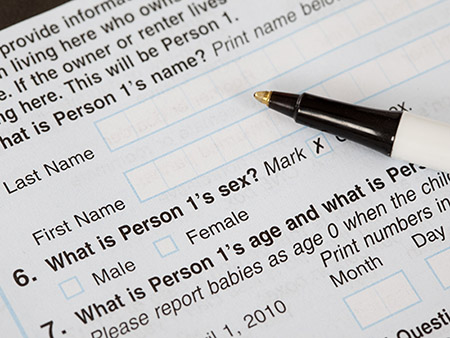 The upcoming 2020 Census’ success is depending on heavy participation from all United States citizens. Learn more about the Census, how it can impact the community and why it is important from UAB political science assistant professor Peter Jones, Ph.D.It is election season, and many United States citizens want their voices to be heard. So, how can they do this?
The upcoming 2020 Census’ success is depending on heavy participation from all United States citizens. Learn more about the Census, how it can impact the community and why it is important from UAB political science assistant professor Peter Jones, Ph.D.It is election season, and many United States citizens want their voices to be heard. So, how can they do this?
According to the United States Census Bureau, once a decade, America collectively counts every resident in the United States, developing national awareness of the importance of the Census and its value to each citizen.
Census data is used to count our population and households. And federal funds, grants and support to states, counties and communities are all based on population totals and breakdowns by sex, age, race and other factors.
The next Census takes place this year, and its success depends on participation from all United States residents. In fact, in mid-March, homes across the country will begin receiving invitations to complete the 2020 Census, which can be accomplished from your home in one of three ways: online, by phone or by mail.
When it comes to allocating political power, Peter Jones, Ph.D., assistant professor in the University of Alabama at Birmingham’s College of Arts and Sciences Department of Political Science and Public Administration, says the Census data is used to assign 435 congressional seats. Jones says Alabama is at risk of losing one of its seven congressional districts.
“In 2010, Alabama had 72 percent of people fill out the census,” Jones said. “The national average was 74 percent. If we continue to lag behind, Alabamians will be undercounted in 2020.”
Jones says distribution of federal funds through funding formulas is also a big issue for Alabama.
| UAB is counting on you. Learn why the 2020 Census is important at uab.edu/uabcounts. |
“Alabama’s Census count will help determine the state’s share of federal aid, and those federal dollars are crucial to the economic health of Alabama,” Jones said. “Over one-third of Alabama’s state budget is funded with transfers from the federal government. In 2017, Alabama received over $10 billion in federal aid. And federal aid tends to be a good deal for Alabamians, as Alabama ranks as one of the most federally dependent states, meaning we pay far less in federal taxes per capita than we receive in federal aid per capita.”
Much of economic and social science research relies on Census-related data. Jones says, to understand how we fund education, for example, we need data about who lives in a school district or county since observable characteristics about our population — race, gender, age and income — are related to our tax preferences.
 Peter Jones, Ph.D., assistant professor, UAB Department of Political Science and Public Administration“In the world of big data, collecting data using advanced analytic techniques has become easier and cheaper; but the quality of the data can sometimes be suspect,” Jones said. “The Census collects a wealth of information about who lives in the United States, and because the data are collected in such a thorough way and reviewed by the Census Bureau, the quality of Census data is incredibly high.”
Peter Jones, Ph.D., assistant professor, UAB Department of Political Science and Public Administration“In the world of big data, collecting data using advanced analytic techniques has become easier and cheaper; but the quality of the data can sometimes be suspect,” Jones said. “The Census collects a wealth of information about who lives in the United States, and because the data are collected in such a thorough way and reviewed by the Census Bureau, the quality of Census data is incredibly high.”
Jones says Census data may help us better understand if there might be voting rights violations.
“If we know a county has a certain percentage of African Americans — based on the census — and we observe a lower percent of African American voter turnout, we would need to look into what was causing that difference,” Jones said. “The Census data allows for us to observe differences we might not see with state or local data, assuming the state and local data exists and is available.”
Ultimately, the 2020 Census will be a snapshot taken by the federal government; therefore, the federal Census data can act as a check on local and state data.
Your response matters. To learn more about how you can participate in the upcoming 2020 Census, visit 2020census.gov.